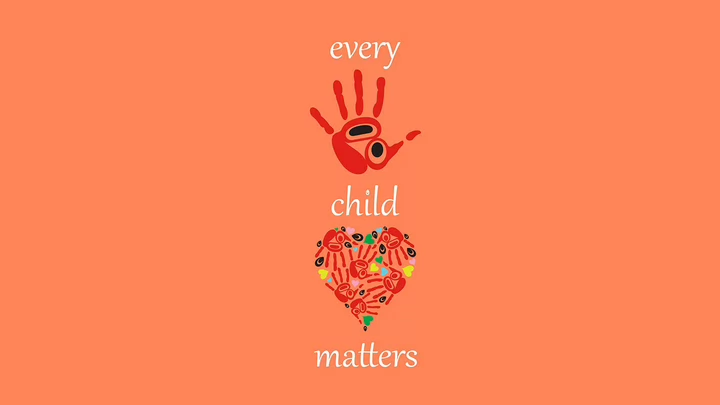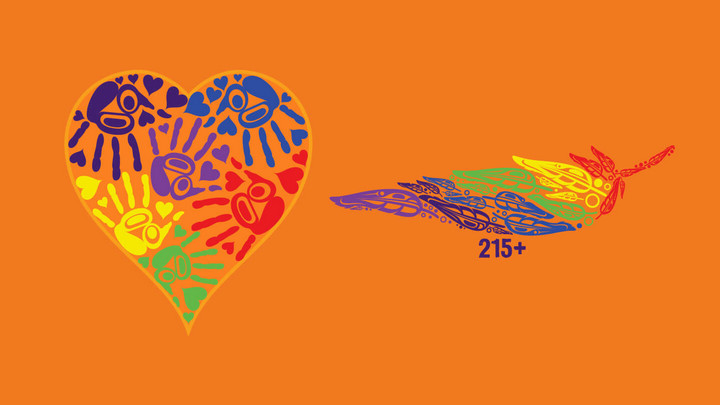Orange Shirt Day
UVic pledges to uphold ʔetalnəw̓əl̓ | ÁTOL,NEUEL | respecting the rights of one another and being in right relationship with all things. We're working to foster truth, respect and mutual understanding with all Indigenous peoples and communities.
Faculty, staff, students, alumni and community members gathered on campus for Orange Shirt Day events on Monday, Sept. 29, 2025. The university closed on Sept. 30, 2025 to mark the National Day for Truth and Reconciliation, a federal statutory holiday to honour the lost children and Survivors of residential schools, their families and communities.
Orange Shirt Day 2025
This year’s gathering holds special meaning as we reflect on the 10th anniversary of the Truth and Reconciliation Commission’s Calls to Action. Ten years on, these Calls continue to guide us, asking us to look with honesty at the truths and harms caused by residential schools while also recognizing the resilience and strength of Survivors, their families and their communities.
At our ceremony, we were honoured to hear from Klith-wii-taa, Dr. Barney Williams, a Residential School Survivor, and Shauntelle Dick-Charleson, Victoria’s Youth Poet Laureate and a member of the Songhees Nation. Alongside Qwul’sih'yah'maht, Robina Thomas, acting president and vice-chancellor and Ry Moran, associate university librarian – reconciliation, they shared reflections, poetry, and teachings.
Resources
Indigenous Hub - UVic Libraries
UVic Libraries has created the Indigenous Hub to provide information pathways to help your learning journey. The hub includes curated resources —many authored by Indigeneous peoples — intended to help advance truth, reconciliation and the establishment of respectful relationships.
Events in the community
Legacy Art Gallery
Sept. 18 - Dec. 6
Legacy Downtown: 630 Yates St., Victoria, BC
Salish Lines
Salish Lines is a selective retrospective of the art and life of SȾÁUTW̱ artist Doug LaFortune curated by Dr. Andrea N. Walsh.
nunuukʷin (we sing): (re)connecting to the natural and spiritual worlds through song
nunuukʷin (we sing): (re)connecting to the natural and spiritual worlds through song is curated by ḥapinyuuk, Dr. Tommy Happynook (huuʕiiʔatḥ /Huu-ay-aht First Nation), this exhibition is based on his personal connections to his homelands and ancestors.
2025 photo gallery
The orange t-shirt design
The designs for the t-shirt were created by Kwakwaka'wakw/Coast Salish artist Carey Newman Hayalthkin'geme, UVic’s Impact Chair in Indigenous Art Practices since 2021.

The red hand represents the ongoing resistance by Indigenous peoples. The Heart and Hands design "was made to honour the children who died in residential school." In terms of reconciliation it calls for us to listen and learn with open hearts and use our hands for the work that needs to be done. The words ‘every child matters’ is to ensure children around the world are protected and kept safe.

The Heart and Hands design "was made to honour the children who died in residential school. The hearts express love for all those in unmarked graves and compassion for the families and communities who waited for them to be found. The small and colourful hands remind us of the uniqueness and beauty of every child. Taken together, they represent our commitment to listen to our hearts and use our hands, to do the work that needs to be done.
The visceral confirmation of Survivor accounts that has come from locating these graves has affected many of us on an emotional level. It has changed the way that many people think and feel about our histories and current realities in Canada."
The Feather design is "a grouping of smaller feathers to create a larger one — is meant to represent that children come in all shapes and sizes, and they're all important."
Individual orders
T-shirts are available for individual purchase.
If you would like to support Orange Shirt Day initiatives, please consider making a $30 donation directly to the Elders Engagement Fund, Witness Blanket Project or Orange Shirt Society.What is Orange Shirt Day?
Orange Shirt Day is a national movement in Canada. In this annual event, Indigenous and non-Indigenous people come together in the spirit of hope and reconciliation to honour former residential-school students, their families and communities. We consider the impacts of the policies and actions of the Government of Canada and the churches that operated the schools.
Orange Shirt Day began in Williams Lake, BC in 2013 at the St. Joseph Mission (SJM) residential school commemoration event, at which survivor Phyllis Webstad told the story of her shiny new orange shirt that was taken away from her on her first day of school at the Mission.
Orange Shirt Day occurs in early fall because this is the time of year when children were removed from their families and forced to attend residential schools. The day inspires Canadians to take part in anti-racism and anti-bullying initiatives at school and at work.
The residential-school era began in the early 1870s, with the last school closing in 1996. More than 150,000 Indigenous, Métis and Inuit children attended these schools. There are an estimated 80,000 survivors living today.
Facing the legacy of residential schools
At UVic, we commit to facing, head-on, the realities of Canada's history and the present. We commit to breaking down the colonial systems and barriers that still exist in our institution and to being accountable in this work.
Learn more about our response and commitments in support of truth and reconciliation.
Support meaningful engagement with Elders
The university has established the ITOTELNEW̱TEL ȽTE: LEARNING FROM ONE ANOTHER Fund (Elders Engagement Fund). It provides meaningful engagement with Elders and opportunities for learning Indigenous ways of knowing for students, faculty and staff.
Support and resources
If you find that you need emotional support after engaging with Orange Shirt Day material, there are some services available.
Gerry Ambers (ʼNa̱mǥis / Kwakwaka'wakw), Elder-in-Residence at the First Peoples House, offers viewers several ways to stay calm and grounded in these challenging times. Produced by the Office of Indigenous Academic and Community Engagement at UVic.
SupportConnect
SupportConnect is a free, confidential mental-health support service for UVic students. You can connect with qualified counsellors, consultants and life coaches by phone or online 24/7. Video or in-person options are available.
Toll-free (calls from North America): 1-844-773-1427
International collect calls: 1-250-999-7621
Counselling for Indigenous students
Indigenous counsellors provide individual and group counselling that treat the heart, body, mind and spirit for Indigenous students. Indigenous counselling sessions are flexible in length, you are seen on the spot for emergency appointments and in general, you can meet with the Indigenous counsellor without having to wait too long.
UVic Counselling Services
Located in the new Student Wellness Centre at 2300 McKenzie Ave., across the street from the CARSA gym. Counselling sessions for UVic students can be booked by calling 250-721-8563. Indigenous counsellors are available.
Indian Residential School Survivors Society Crisis Line
24-hour crisis line for survivors and family of survivors. Toll-Free: 1-866-925-4419
First Nations Health Authority (FNHA) Mental Health Benefits
FNHA partners with Indigenous Services Canada to offer a comprehensive mental-health plan to First Nations in BC. The plan covers counselling services from qualified mental-health providers, including psychologists, clinical counsellors and social workers.
Here2Talk
Connects students to mental-health support when they need it. Through this program, all students currently registered in a BC post-secondary institution have access to free, confidential counselling and community-referral services, conveniently available 24/7 via app, phone and web.
The Vancouver Island Crisis Line
24-hour crisis line service to Vancouver Island, the islands of the Georgia Strait, and the mainland communities between Powell River and Rivers Inlet, as defined by Island Health. It operates 365 days a year. Crisis workers provide short-term, non-judgmental emotional, support, crisis intervention, information and resources. Toll-free: 1-888-494-3888
KUU-US Crisis Line Society
The KUU-US Crisis Line Society operates a 24-hour provincial Aboriginal crisis line for adults/Elders and youth.
Adults/Elders: 250-723-4050
Children/Youth: 250-723-2040
Toll-free Line: 1-800-588-8717

